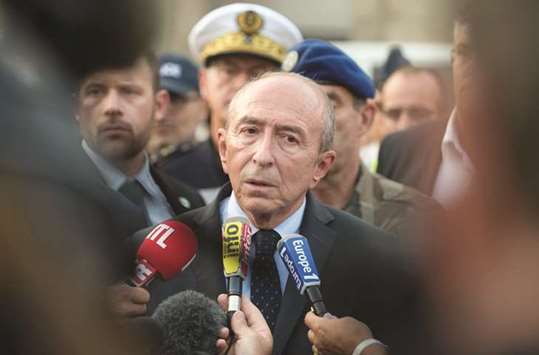The vote comes following a string of attacks in France since 2015 and just two days after more bloodshed in the southern port city of Marseille when a suspected religious extremist killed two women with a knife.
While Interior Minister Gerard Collomb defends the bill as a “lasting response to a lasting threat”, it has come under fire from human rights groups.
“What makes us angry is that it’s a state of emergency that would become permanent and roll back our freedoms,” said Christine Lazerges, the head of the National Consultative Committee on Human Rights, a state body.
The law, designed to replace the state of emergency that France has been under since the November 2015 Paris attacks, would come into force on November 1 if approved by both houses of parliament.
The lower house will vote today on the bill which will give authorities the power to place people under house arrest, order house searches and ban public gatherings without the prior approval of a judge.
The state of emergency was meant to be temporary but was extended six times for various reasons, such as the need to protect major sporting and cultural events, as well as presidential and parliamentary elections earlier this year.
The vote comes after a man stabbed two women to death on Sunday at the main train station in Marseille while shouting “Allahu Akbar”.
He was shot dead by soldiers.
The Islamic State (IS) group claimed that the attacker was one of its “soldiers”, though a source close to the investigation told AFP that no solid evidence linked him to the extremist group.
The stabbings bring to 241 the number of people killed in religious militant attacks in France since January 2015, while Collomb said last month that 12 planned attacks have been foiled since the start of the year.
In an environment of widespread fear about religious militant violence, extensions of the state of emergency have met with little public opposition, with critics of the new law limited to the hard left and human rights groups.
“Gradually our public freedoms ... are being eroded,” said lawmaker Alexis Corbiere of the hard-left France Unbowed party.
Last week two UN experts raised fears that the bill could see security forces discriminate against Muslims and undermine France’s standing as a beacon for human rights.
“The normalisation of emergency powers has grave consequences for the integrity of rights protection in France, both within and beyond the context of counter-terrorism,” UN human rights expert Fionnuala Ni Aolain warned.
Under international human rights standards, “the duration of the state of emergency must be time-bound, revised regularly, and meet the criteria of necessity and proportionality”, she wrote in a letter co-signed by Michel Forst, the UN’s special rapporteur on human rights defenders.
In their letter, addressed to the French authorities, they said that the bill’s “vague definition of terrorism” deepened fears that “emergency powers could be used in an arbitrary way”.
Some lawmakers from the French right-wing Republicans party as well as the leader of the far-right National Front have criticised the bill for not going far enough.
Far-right leader Marine Le Pen, calling the proposed legislation “soft”, said it could not be considered “the great law to eradicate (religious) terrorism”.
Interior Minister Collomb said last week the bill “aims to guarantee the fullness of our individual and collective freedoms but promises that all measures will be taken to ensure the security of the French people”.
Macron, whose centrist party has a comfortable parliamentary majority, has promised that the legislation, which was approved by the Senate in July, would be reviewed in 2020.

